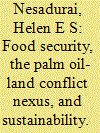| Srl | Item |
| 1 |
ID:
125794


|
|
|
|
|
| Publication |
2013.
|
| Summary/Abstract |
This paper examines the nexus between food security and sustainability governance through a case study of palm oil. Palm oil's advocates claim that campaigns against palm oil and actions to halt its expansion due to sustainability concerns can undermine its food security role. However, palm oil expansion more directly undermines the food and livelihood security of rural and indigenous communities when land that rightfully belongs to, or has been used by, these communities is alienated to firms for oil palm cultivation with little or no consultation or compensation provided or alternatives considered. It is in this context that the paper examines whether the multi-stakeholder Roundtable on Sustainable Palm Oil (RSPO) is able to ensure that this commodity is cultivated in ways that minimise environmental damage and livelihood disruption, thereby safeguarding palm oil's contribution to food security. The findings are mixed. RSPO certification provides fairly comprehensive and progressive socio-environmental regulation that has enhanced sustainable production practises in this industry especially by the larger transnational plantation companies mindful of their global reputation. The RSPO is also far more responsive than governments have been to the land rights of rural and indigenous communities, providing due process for land claimants as well as recognising that these communities may have legitimate rights to land even if companies were awarded legal title by governments. However, multi-stakeholder regimes can be fragile, requiring a great deal of internal accommodation and trade-offs to work. Already, different interests in the RSPO are pulling in different directions while national certification systems have emerged that are less onerous compared to the RSPO even as the latter seeks to further enhance its sustainability credentials.
|
|
|
|
|
|
|
|
|
|
|
|
|
|
|
|
| 2 |
ID:
138986


|
|
|
|
|
| Summary/Abstract |
The literature on the “new global land grab” has to date been preoccupied with macro and theoretical studies, resulting in a lack of in-depth local studies. This article uses a Liberian case study and quasi-anthropological methods to address this imbalance. In Liberia, historical confrontations over resource access that are tied to issues of land ownership have been given new life by the interjection of a Malaysian palm oil corporation. Elders, as the biggest potential losers in the confiscation of land, have successfully linked themselves to NGOs and transnational advocacy campaigns that publicize land grabbing and pressure for international standards and compliance. At the same time, young men who largely came of age during the civil war have been rendered invisible and palpably frustrated. In exploring the generational divide that has characterized the Sime Darby plantation, this article not only reveals that land grabbing has its supporters as well as its detractors, but also unmasks the role that NGO advocacy networks play in local politics and in shaping the narratives that the wider world hears about the response of African communities to new development trends.
|
|
|
|
|
|
|
|
|
|
|
|
|
|
|
|